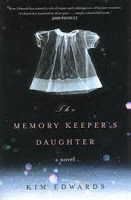Book Review: The Memory Keeper's Daughter
“A moment might be a thousand different things.”
In The Memory Keeper’s Daughter, every present moment is composed of layers of the past, like a gauze veil that obstructs sight. A moment is composed of infinite perspectives, not only of those involved, but even for an individual who sees all the preceding events that have led to this place and time.
 Kim Edwards’ novel has an intriguing premise. On a snowy night, Dr. David Henry delivers his own twins – a boy and a girl. He quickly realizes that while his son Paul is healthy, Phoebe exhibits signs of Down syndrome. Fearing that his daughter doesn’t stand a chance of a normal life, and endeavoring to protect his wife Norah from future heartache, he impulsively hands over Phoebe to his nurse Caroline with instructions to take her to a nearby institution. To his wife, he fabricates a story that Phoebe has died in birth. But his nurse Caroline cannot abide leaving the child at the home, so she flees into the night, determining to raise the child as her own. Over the course of the novel, the consequences of this single act unfold. While David and Norah raise Paul, Caroline builds a home for Phoebe.
Kim Edwards’ novel has an intriguing premise. On a snowy night, Dr. David Henry delivers his own twins – a boy and a girl. He quickly realizes that while his son Paul is healthy, Phoebe exhibits signs of Down syndrome. Fearing that his daughter doesn’t stand a chance of a normal life, and endeavoring to protect his wife Norah from future heartache, he impulsively hands over Phoebe to his nurse Caroline with instructions to take her to a nearby institution. To his wife, he fabricates a story that Phoebe has died in birth. But his nurse Caroline cannot abide leaving the child at the home, so she flees into the night, determining to raise the child as her own. Over the course of the novel, the consequences of this single act unfold. While David and Norah raise Paul, Caroline builds a home for Phoebe.
I love novels that examine the repercussions of decisions – how a single act can impact so many separate lives. It reminds me that life is sometimes composed of chaotic and coincidental threads that keep us connected.
Unfortunately, The Memory Keeper’s Daughter rarely lives up to its potential. The plot relies on a predictable series of events – marital discontent, affairs, troubled youth – so that the characters can spend plenty of time ruminating about the past. These events are supposed to be symptoms of a deeper problem, but they often feel like convenient shorthand rather than actual consequences of David’s decision. There’s trouble in a marriage, so of course one of the partners turns to an affair. There’s trouble between a father and son, so of course the son tries drugs.
Edwards examines the internal lives of her characters in careful detail, but to do so she relies on convenient solutions to plot problems. Despite the emotional turmoil they endure, somehow things sort of work themselves out.
For example, Caroline is a single mother raising a daughter with Down syndrome. She manages to get a job as a home caretaker to a crotchety old man and his more benevolent daughter. After the old man dies, Caroline continues to live with the daughter, and when the daughter eventually retires, she signs over the deed of the house. In other words, the daughter is a benefactor because that conveniently allows Caroline to get a home.
 In another sequence, Dr David Henry returns to his childhood home, only to find a pregnant teenager squatting on the premises. He takes her home, helps her raise her son, and even though this is the final straw in his fracturing marriage, somehow Norah never manages to press him on his reasons for doing this. The marriage falls apart, and David is free to be the benefactor to this young girl, and somehow there are no explosions, no real repercussions. The characters go on with their lives without ever challenging the status quo.
In another sequence, Dr David Henry returns to his childhood home, only to find a pregnant teenager squatting on the premises. He takes her home, helps her raise her son, and even though this is the final straw in his fracturing marriage, somehow Norah never manages to press him on his reasons for doing this. The marriage falls apart, and David is free to be the benefactor to this young girl, and somehow there are no explosions, no real repercussions. The characters go on with their lives without ever challenging the status quo.
The theme of the novel, of course, is the pervasive nature of memory. The author chooses to examine in minute detail what the characters are feeling, without ever giving them the freedom to bridge the gaps in their lives. It’s like life is one long flashback sequence. In one scene at his son’s birthday party, David indulges in a memory:
“I suppose this is it, his father had said, slamming the truck door and standing on the curb by the bus stop on the day David left for Pittsburgh. I suppose this is the last we can expect to hear from you, moving up in the world and all. You won’t have time for the likes of us anymore. And David, standing on the curb with early leaves falling down around him, had felt a deep sense of desperation, because even then he sensed the truth of his father’s words: whatever his own intentions were, however much he loved them, his life would carry him away.”
In the next sentence, someone pulls David back to the present: ‘Are you all right, David?’ Kay Marshall asked. She was walking by, carrying a vase of pale pink tulips, each petal as delicate as the edge of a lung. ‘You look a million miles away.’” (p. 148)
This happens an awful lot throughout the book: a character disappears into a memory, and it’s like the whole story comes to a halt while the flashback unfolds. When Paul is examining his father’s boxes of photographs, one of his friends interrupt him: “’You ever coming out, or what?’” I felt like asking that a lot.
Ultimately, I was pretty frustrated with the book. Maybe it was because my expectations were not met. Given that the title refers to the daughter, I figured Phoebe would be more of a central character, but she is kept mostly to the sidelines. She comes across as a symbol rather than a fully realized character.
Clearly there was a lot of potential there, and certainly plenty of beautifully composed scenes of grief and loss. But the contrived nature of the plot left me wishing that more unexpected chances had been taken. Maybe the author wants to suggest that certain actions call forth specific ends, but I think that a little variety in the choices that were made could still have resulted in the ending that she constructed.
Maybe a moment is a thousand different things, but this novel focuses predominantly on one thing: memory, rather than the present, is where we live.
In The Memory Keeper’s Daughter, every present moment is composed of layers of the past, like a gauze veil that obstructs sight. A moment is composed of infinite perspectives, not only of those involved, but even for an individual who sees all the preceding events that have led to this place and time.
 Kim Edwards’ novel has an intriguing premise. On a snowy night, Dr. David Henry delivers his own twins – a boy and a girl. He quickly realizes that while his son Paul is healthy, Phoebe exhibits signs of Down syndrome. Fearing that his daughter doesn’t stand a chance of a normal life, and endeavoring to protect his wife Norah from future heartache, he impulsively hands over Phoebe to his nurse Caroline with instructions to take her to a nearby institution. To his wife, he fabricates a story that Phoebe has died in birth. But his nurse Caroline cannot abide leaving the child at the home, so she flees into the night, determining to raise the child as her own. Over the course of the novel, the consequences of this single act unfold. While David and Norah raise Paul, Caroline builds a home for Phoebe.
Kim Edwards’ novel has an intriguing premise. On a snowy night, Dr. David Henry delivers his own twins – a boy and a girl. He quickly realizes that while his son Paul is healthy, Phoebe exhibits signs of Down syndrome. Fearing that his daughter doesn’t stand a chance of a normal life, and endeavoring to protect his wife Norah from future heartache, he impulsively hands over Phoebe to his nurse Caroline with instructions to take her to a nearby institution. To his wife, he fabricates a story that Phoebe has died in birth. But his nurse Caroline cannot abide leaving the child at the home, so she flees into the night, determining to raise the child as her own. Over the course of the novel, the consequences of this single act unfold. While David and Norah raise Paul, Caroline builds a home for Phoebe.I love novels that examine the repercussions of decisions – how a single act can impact so many separate lives. It reminds me that life is sometimes composed of chaotic and coincidental threads that keep us connected.
Unfortunately, The Memory Keeper’s Daughter rarely lives up to its potential. The plot relies on a predictable series of events – marital discontent, affairs, troubled youth – so that the characters can spend plenty of time ruminating about the past. These events are supposed to be symptoms of a deeper problem, but they often feel like convenient shorthand rather than actual consequences of David’s decision. There’s trouble in a marriage, so of course one of the partners turns to an affair. There’s trouble between a father and son, so of course the son tries drugs.
Edwards examines the internal lives of her characters in careful detail, but to do so she relies on convenient solutions to plot problems. Despite the emotional turmoil they endure, somehow things sort of work themselves out.
For example, Caroline is a single mother raising a daughter with Down syndrome. She manages to get a job as a home caretaker to a crotchety old man and his more benevolent daughter. After the old man dies, Caroline continues to live with the daughter, and when the daughter eventually retires, she signs over the deed of the house. In other words, the daughter is a benefactor because that conveniently allows Caroline to get a home.
 In another sequence, Dr David Henry returns to his childhood home, only to find a pregnant teenager squatting on the premises. He takes her home, helps her raise her son, and even though this is the final straw in his fracturing marriage, somehow Norah never manages to press him on his reasons for doing this. The marriage falls apart, and David is free to be the benefactor to this young girl, and somehow there are no explosions, no real repercussions. The characters go on with their lives without ever challenging the status quo.
In another sequence, Dr David Henry returns to his childhood home, only to find a pregnant teenager squatting on the premises. He takes her home, helps her raise her son, and even though this is the final straw in his fracturing marriage, somehow Norah never manages to press him on his reasons for doing this. The marriage falls apart, and David is free to be the benefactor to this young girl, and somehow there are no explosions, no real repercussions. The characters go on with their lives without ever challenging the status quo.The theme of the novel, of course, is the pervasive nature of memory. The author chooses to examine in minute detail what the characters are feeling, without ever giving them the freedom to bridge the gaps in their lives. It’s like life is one long flashback sequence. In one scene at his son’s birthday party, David indulges in a memory:
“I suppose this is it, his father had said, slamming the truck door and standing on the curb by the bus stop on the day David left for Pittsburgh. I suppose this is the last we can expect to hear from you, moving up in the world and all. You won’t have time for the likes of us anymore. And David, standing on the curb with early leaves falling down around him, had felt a deep sense of desperation, because even then he sensed the truth of his father’s words: whatever his own intentions were, however much he loved them, his life would carry him away.”
In the next sentence, someone pulls David back to the present: ‘Are you all right, David?’ Kay Marshall asked. She was walking by, carrying a vase of pale pink tulips, each petal as delicate as the edge of a lung. ‘You look a million miles away.’” (p. 148)
This happens an awful lot throughout the book: a character disappears into a memory, and it’s like the whole story comes to a halt while the flashback unfolds. When Paul is examining his father’s boxes of photographs, one of his friends interrupt him: “’You ever coming out, or what?’” I felt like asking that a lot.
Ultimately, I was pretty frustrated with the book. Maybe it was because my expectations were not met. Given that the title refers to the daughter, I figured Phoebe would be more of a central character, but she is kept mostly to the sidelines. She comes across as a symbol rather than a fully realized character.
Clearly there was a lot of potential there, and certainly plenty of beautifully composed scenes of grief and loss. But the contrived nature of the plot left me wishing that more unexpected chances had been taken. Maybe the author wants to suggest that certain actions call forth specific ends, but I think that a little variety in the choices that were made could still have resulted in the ending that she constructed.
Maybe a moment is a thousand different things, but this novel focuses predominantly on one thing: memory, rather than the present, is where we live.
Published on July 22, 2016 09:38
No comments have been added yet.



